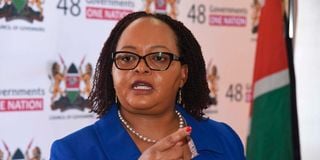Premium
CoG Chair Anne Waiguru lauds bid to fund climate action in counties

Council of Governors chair Anne Waiguru addresses journalists at the council’s Delta Corner headquarters in Westlands, Nairobi.
Kenya is headed in the right direction in unlocking the flow of climate financing to the sub-national level.
This is according to Council of Governors Chairperson Anne Waiguru, who said devolved financing models for climate change adaptation piloted in Kenya have showed strong evidence of effectiveness.
Kenya, the Kirinyaga governor revealed, had pioneered a climate change governance mechanism to increase funding for local climate action, including the establishment of the County Climate Change Fund (CCCF), comprising climate change legislations enacted by county governments and a county-controlled fund that finances climate projects identified and prioritised by local communities.
“Piloting of innovative decentralised [funding] took place between 2011 and 2018 by the Adaptation Consortium in the arid and semi arid counties of Garissa, Isiolo, Kitui, Makueni, and Wajir, where the financial and governance structures ... were designed, demonstrated, and strengthened while ensuring that local communities were central in decision-making,” Ms Waiguru said.
“The legislations provide for allocation of between one per cent and three per cent of development budgets to climate action in the 47 counties, with 45 having already enacted the legislations,” she said, while addressing a session of the COP28 forum in Dubai, UAE.
The session that was organised by Bloomberg Philanthropies was attended by, among others, Mr Renato Casagrande, the governor of Espírito Santo in Brazil, Mr Mauricio Kuri González, the governor of Queretaro in Mexico, and Mr Lamin Saidykhan, the governor of North Bank Region in The Gambia.
Ms Waiguru described the CCCF as a key component in a national planning and financing framework that strengthens local capacity and channels resources to community-driven climate action priorities.
Kenya, she noted, is implementing the Financing Locally-Led Climate Action (FLLOCA) Programme that seeks to strengthen the capacity of sub-national governments to plan, track and implement climate resilient projects through climate proofing of investments and cushioning communities from climate shocks and stresses.
She added that, during the design stages of the FLLOCA Programme, Kenya adopted an inter-agency approach involving the National Treasury, the Climate Change Directorate, the Council of Governors, county governments and other key stakeholders to spearhead efforts to improve local climate action as per their respective mandates as prescribed in the National Climate Change Action Plan. She said that, following the inception of the FLLOCA Programme, the financing model has now been adopted in all 47 county governments in Kenya.
Ms Waiguru added that counties have also received $8.9 million in funding under the FLLOCA while another $66.3 million for climate resilient investment grant will be disbursed during the current financial year.
She cited Kirinyaga County, where the administration has mainstreamed climate action into its development agenda by onboarding small-scale farmers.
She said her administration has been supporting farmers to increase agricultural productivity through climate smart initiatives that mitigate against adverse impacts of climate change such as drought and floods as well as addressing post-harvest losses of their produce.
She observed that collaboration between the national and sub-national governments and unlocking climate finance require accurate stakeholder mapping to enable the use of the needed skill-sets and expertise into the design of programmes and projects.
She said putting in place minimum access and performance conditions helps catalyse localised actions to enable sub-national governments to access financing and channel the resources towards resilience building and interventions.
To enhance mobilisation of private finance, Ms Waiguru highlighted the need to address challenges such as limited capacity, policy and regulatory uncertainty, risk perception, financial constraints, among others.
She also stressed on the need to further invest in capacity-building initiatives for sub-national governments to enhance their ability to plan, implement, and manage climate initiatives.
“There is also need for policy alignment to ensure alignment between national and sub-national climate policies and regulations as well as establishment of a clear and consistent legal framework that provides stability and predictability for private investors. We should develop mechanisms to mitigate perceived risks, such as providing guarantees, insurance, or risk-sharing mechanisms to encourage private investment in climate initiatives,” she said.
She called for exploration of innovative financing mechanisms, such as green bonds, climate funds, and public-private partnerships, to mobilise additional resources for climate projects.





